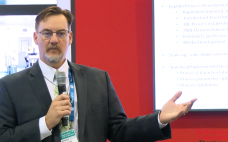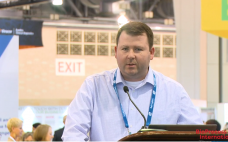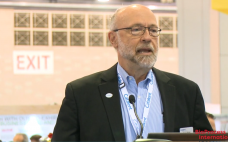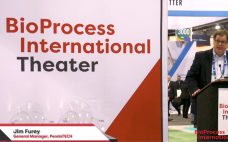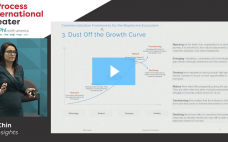Representing Hitachi Chemical Advanced Therapeutic Solutions, Alex Klarer spoke to the BPI Theater at BIO on Tuesday, 4 June 2019, about ways to improve patient access to revolutionary T-cell immunotherapies. A feasible solution, Klarer contended, is to develop a form of stirred-batch bioculture that reduces the entire manufacturing process while still maintaining high expansion rates with low media use. To establish this as a possibility, Klarer described his firm’s experiments with small and large batches on a Distek cell culture…
BPI Theater
Process Development of a Closed CAR-T Manufacturing Process
Representing GE Healthcare, Rohin Iyer joined BPI Theater at BIO on Tuesday, 4 June 2019, to explore how academic and clinical drug sponsors could partner with service providers to develop bioprocesses more akin to those in the industry at large. Iyer chronicled GE’s collaboration with the non-profit Center for Commercialization of Regenerative Medicine (CCRM), a public–private partnership in which a team of 105 people (both GE Healthcare and CCRM employees) work together at one location. Elaborating this example, Iyer pointed…
Blockbuster 2.0: Who’s Ready?
During a BPI Theater at BIO presentation on Wednesday, 5 June 2019, Charles Christy, director of commercial development at Ibex Solutions (Lonza Pharma and Biotech), considered the increasing speed of molecule discovery, process development, and clinical approval in the biopharmaceuticals industry. Weighing the promises and pitfalls of such a volatile, uncertain market, Christy offered drug developers advice about when to build biomanufacturing facilities in-house and when to outsource services. One solution, Christy suggests, is to partner with agile contract development…
Quality Considerations for Introducing New Products into Your Facility
Ray Marzouk, vice president of quality at Avid Bioservices, joined the BPI Theater at BIO on Wednesday, 5 June 2019, to call out factors that drug developers often neglect when they are deciding whether to enlist a contract development manufacturing organization (CDMO) for scaling up and introducing new therapies in a competitive market. Citing examples related to ICH Q5d cell banking rules, Marzouk explained how Avid conducts smooth and rapid transfers of key process elements and quality diagnostics. Streamlining that…
Next-Generation Manufacturing for Biopharmaceuticals
In this BPI Theater @ BIO presentation from Tuesday, 4 June 2019, Thomas Page, a vice president of engineering and asset development, explains how Fujifilm Diosynth partners with other organizations to deliver commercial-quality chemistry, manufacturing, and controls (CMC) for complex, next-generation biopharmaceuticals. Rather than simply transacting with clients, Page notes, his firm elects to go beyond standard engineering controls for patient safety and clinical filing. Using a wider array of risk assessments than is typical in the industry enables Fujifilm…
The Cocoon Platform: A Kaleidoscope Approach to Cell Therapy Manufacturing
Matthew Hewitt, the head of clinical development at Lonza’s Walkersville headquarters, unveiled the company’s Cocoon platform at the BPI Theater @ BIO on Tuesday, 4 June 2019. Scalable, fully closed, single-use–capable, and intuitively interfaced, the platform offers what Hewitt terms a kaleidoscope approach to cell therapy manufacturing because it enables drug developers increased ability to customize their processes. The technology also addresses many pain points specific to the cost of cleanroom space, labor, and scalability. These exciting features, Hewitt concludes,…
Cell Line Development Strategies for Difficult-to-Express Proteins
Steven Hager, a senior director of technical support, joined the BPI Theater at BIO on 5 June 2019 to describe how Catalent Biologics’s emerging cell-line engineering technologies can aid in developing therapies based on difficult-to-express proteins. Hager presented two case studies to this end, the first involving insertion of a tag into an antibody for conjugation with a toxin to create an antibody–drug conjugate (ADC), and the second showing another antibody with two sites for conjugation on each chain. Using…
Qualification of Single-Use Sensors for Batch and Continuous Processes
In this 5 June 2019 presentation at the BPI Theater at BIO, Jim Furey contended that the term Industry 4.0 is actually about developing robust sensor systems. A general manager at PendoTECH, Furey recounted experiences with biomanufacturers who chronically reported single-use sensor failures due to intense processing requirements. Even if a process does not involve harsh solvents, Furey points out, several preparation steps can pose problems for single-use sensor systems. Using these experiences, Furey makes the case for more carefully…
A Road Map to Licensure of MAb Manufacturing: Implementing Multicolumn Capture Chromatography
Lilon Huang, a principal engineer of manufacturing operations, delivered a BPI Theater presentation at the BIO International Convention on Wednesday, 5 June 2019, to detail Emergent BioSolution’s efforts to enter the continuous processing arena, specifically the use of multicolumn chromatography. While the move to this technology was designed to reduce costs, Huang explains, it has also created opportunities to partner with industrial leaders in ways that afford crucial feedback for drug design and development.
Commercialization Frameworks for the Biopharma Ecosystem
Kiran Chin, managing partner and CEO, MKA Insights Chin began her presentation by introducing her company and its focus on helping bioprocess, life sciences, clinical diagnostics, and gene therapy companies accelerate growth. Although there is no shortage of information on data processes, Chin has found that many companies lack focus on some fundamentals that drive commercialization strategies. Companies tend to dive in without asking basic questions: Why do we exist? What are our capabilities? What is the technology that we…





